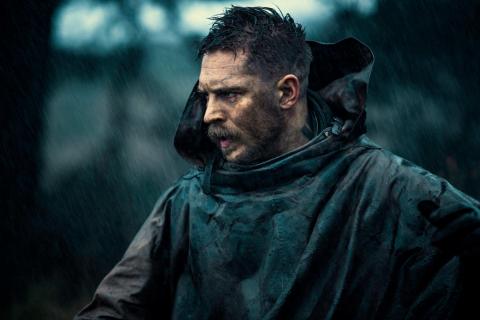Set more than 200 years ago in muddy London, the period piece Taboo is a vivid but pokey FX mini-series about international adventurer James Delaney (Tom Hardy), who returns to England to claim an inheritance, avenge his dead dad, and inflict an empire’s sins upon it. The three episodes sent to reviewers have a nightmarish hypnotic power, with fanatically detailed sets and costumes, a CGI-heavy production design that suggests Sin City by way of Charles Dickens, and a snarling, Clint Eastwood–style Frankenstein’s monster anti-hero at its center. Delaney is a flesh-and-blood man with a history and a personality, and his work on behalf of the East India Tea Company (an early transnational corporation that’s portrayed as having more power than some governments) has traumatized him so deeply that when he’s alone, away from the sight lines of those he’s hoping to intimidate, he struggles to hold the shattered pieces of himself together. More often, though, Delaney is a revenge-movie protagonist with villainous, even demonic qualities. When he strides through London alleyways in his long coat and top hat, he’s sometimes framed and lit like an artist’s interpretation of Jack the Ripper. (One of Taboo’s many pop-culture reference points is High Plains Drifter, a 1973 Western starring Eastwood as a stranger who repaints a town red, renames it Hell, and punishes its inhabitants for signing off on a man’s murder to cover up a real-estate conspiracy.)
When Delaney gets up in the faces of people who made him do bad things or who are trying to evade their responsibility for other people’s suffering, the series becomes a curiously Freudian political drama: Taboo is about the return of the repressed, but also the suppressed, with Delaney serving as a vessel for social commentary about the species-wide violence and corruption wrought by imperialism, racism, and capitalism. (The character is introduced in a literally thunderous montage that uses rain and ocean imagery to suggest a nightmarish birth, or rebirth.) Delaney’s travels and missions brought him in contact with the genocide against Native Americans and the horrors of the international slave trade; his back is inscribed with tattoos from his time in Africa, and he’s haunted by ghostly visions of evil deeds he saw and did. Of course this is all quite on the nose (knowingly so), but Taboo is averse to flat-out telling us that this privileged white Englishman has somehow become the Other; this is probably the only way in which this mini-series could be called subtle.
Unfortunately, Peak TV bloat saps much of the tale’s effectiveness. Taboo ambles along, drinking in the sooty urban vistas and foggy waterfronts and treating us to close-ups of decayed corpses, sick flesh, vermin, and filth. These images drive home the fact that life was much harder for Western city dwellers before electricity, running water, vaccinations, and the like; but it’s worth asking if they tell anything we didn’t already know (or got after the first ten times Taboo showed them to us), and they pull much-needed focus from all the dramatic confrontations, which are soap-opera juicy, bordering on cartoonish. Delaney has an unnatural attraction to his sister Zilpha (Oona Chaplin), and loathes her snooty husband Thorne (Jefferson Hall), who thinks Delaney is a horrid brute and wants to claim the elder Delaney’s land near Nootka Sound in Canada. The East India Tea Company, represented by its tented-fingers bad guy of a president (Jonathan Pryce), wants the land, too, because it has both military and economic value to the British and American governments; but it soon becomes clear that the rightful owner, Delaney, is essentially Marlow from Heart of Darkness, back from the jungle and royally pissed. A certain repetitiveness sets in soon, unfortunately. Many of the showdowns feel as if they’re duplicating information we’ve already absorbed or revisiting emotions we’ve already explored, and there are too many moments when you may legitimately question if this production truly needed to be a multi-part TV program as opposed to a self-contained film, play, or graphic novel. (Pryce doesn’t play every one of his scenes sitting at a desk or table while waving documents and yelling, but it feels that way.)
All that being said, this is clearly an obsessive, personal work, and it’s intriguing on that level — more so if you’re a fan of Tom Hardy, who has become the most exciting example of the Miserablist school of acting. He combines the theatrical bigness of Orson Welles and Sir Laurence Olivier with the eerie hypernaturalism of Robert De Niro in his prime. Hardy created the main character of Taboo, worked out a basic story for him with his father, writer Chips Hardy, then handed things off to writer and filmmaker Steven Knight, who turned the concept into a mini-series that aired on BBC One over the weekend and debuts on FX tonight. It’s clear that Hardy and Knight understand each other on a deep level; between this, Peaky Blinders, and the superb, under-seen indie drama Locke, they’re carving out a collaborative body of work in the vein of Scorsese and De Niro. This one is more fun to think about than it is to watch, but it deserves points for weirdness, and for not being manufactured to satisfy a preexisting niche — unless the market for Dickens-flavored soap-opera revenge Westerns is a phenomenon that escaped my attention.


Spread the word